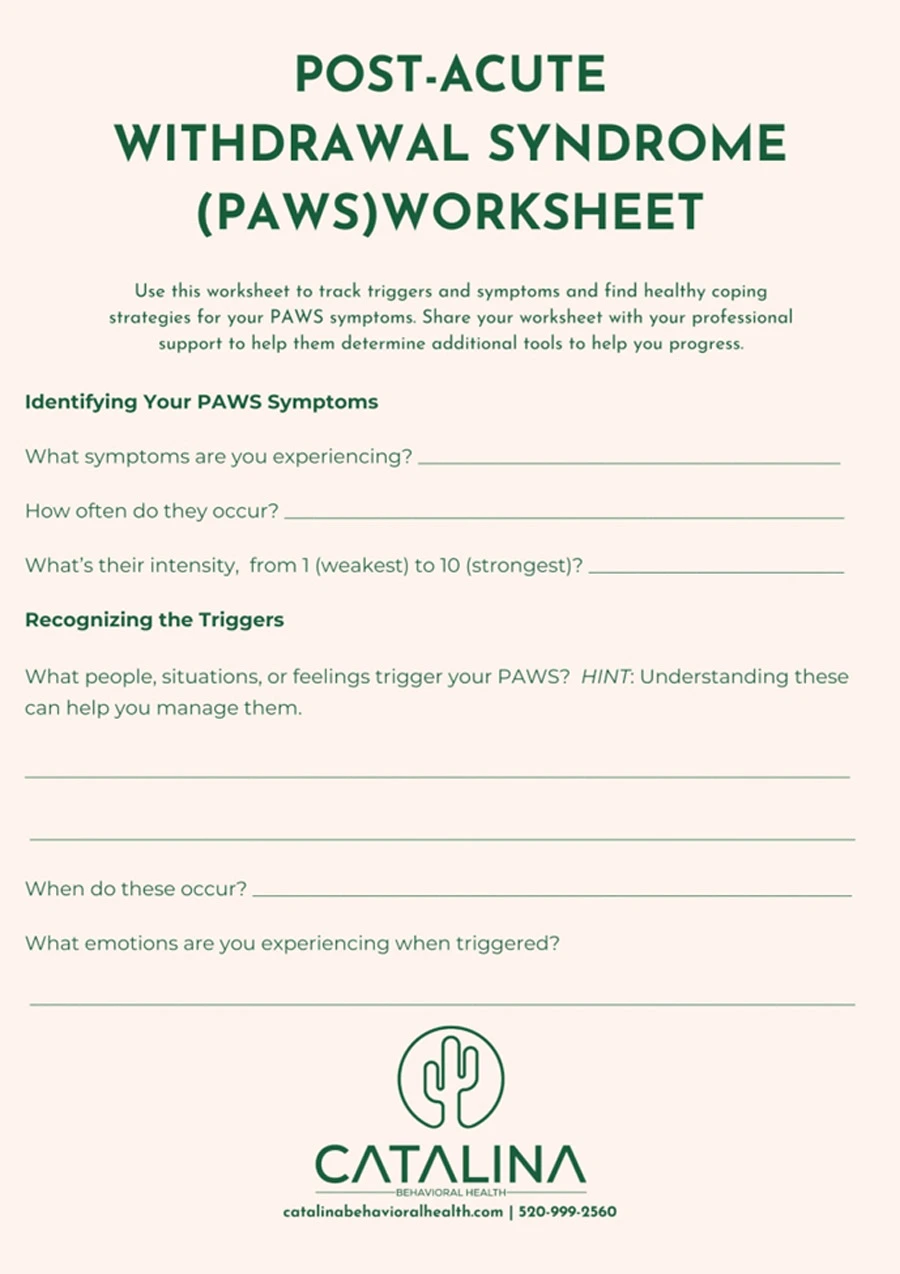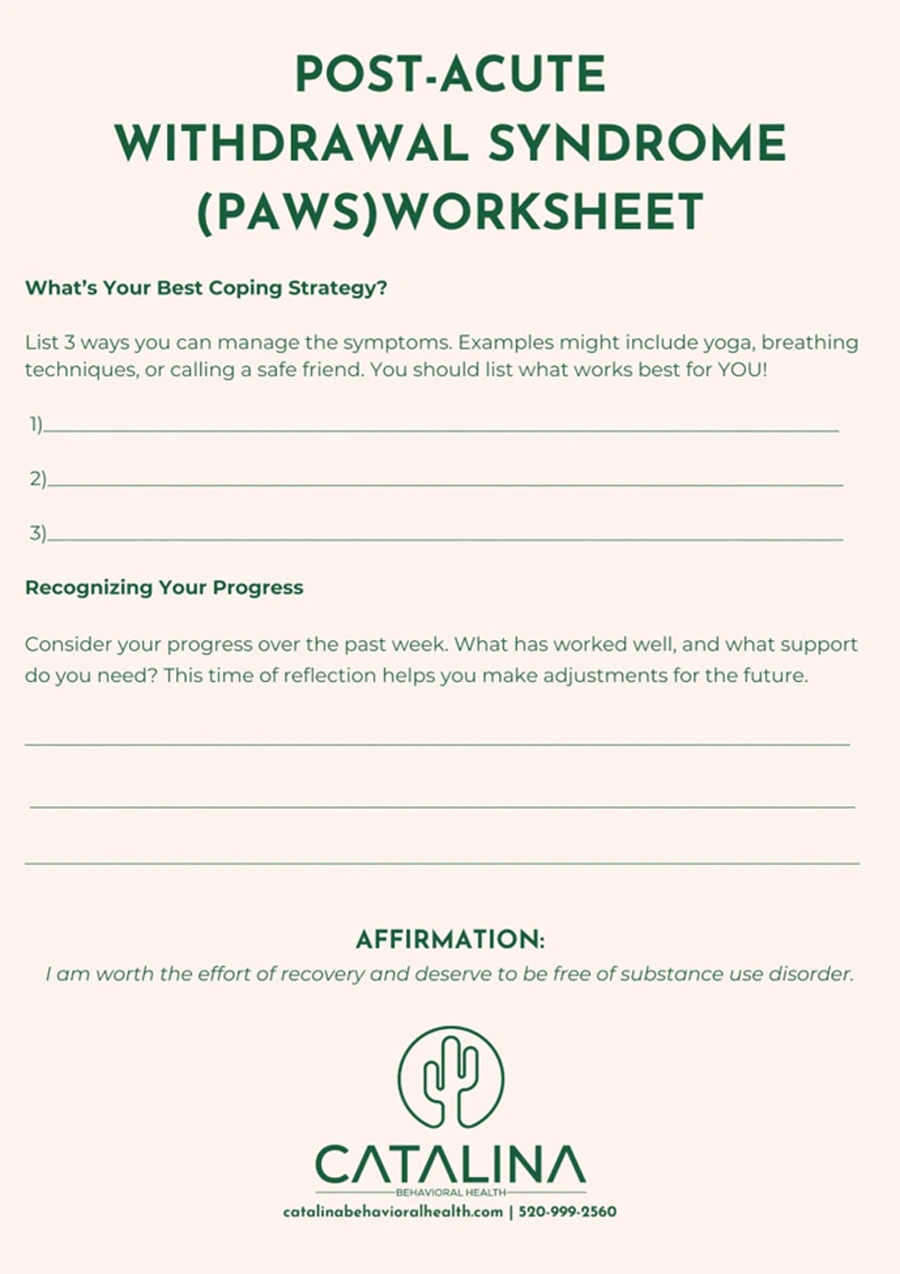Using Worksheets to Get Past PAWs Symptoms in Early Recovery
Almost 1 in 6 Americans admitted to having experienced substance abuse issues in a 2022 SAMHSA survey. Healing substance use disorders requires getting clean and sober at the beginning of treatment, with many experiencing post-acute withdrawal syndrome (PAWS). These mental and physical symptoms can last for several months after the drug or alcohol withdrawal.
The complexity of the addiction recovery process proves the need for professional help for those ending their struggles. Our free PDF post acute withdrawal syndrome worksheets can help provide you a tool to support yourself when needed.
Catalina Behavioral Health is a Joint Commission-accredited drug and alcohol recovery center in Tucson, Arizona. Our upscale, state-of-the-art treatment facility provides emotional support to every client on their recovery journey, from the time they contact our admissions department to schedule care to create a post-treatment care plan.
Our evidence-based medical interventions help manage the common symptoms of PAWS so clients can have long-term recovery.
Please join us to learn more about how you or your loved one can minimize the emotional and physical discomfort of experiencing withdrawal symptoms – for the duration of treatment and sometimes for months afterward.
Be sure to grab the free PDF download to keep track of your PAWS symptoms and understand the underlying issues that trigger them.
Get a Confidential Assessment and Insurance Verification
Post-Acute Withdrawal Symptoms (Protracted Withdrawal)
Before we discuss the worksheet, it’s worth a quick overview of PAWS symptoms and why they happen. Having an understanding can give you a more holistic look at why our post-acute withdrawal syndrome PDF can help you avoid the risk of relapse.
Key Symptoms of Post-acute Withdrawal Syndrome
PAWS occurs within a day to several weeks after the acute withdrawal phase ends. Its onset is influenced by several factors, including:
- The type of substance use (alcohol abuse, opioid addiction, benzodiazepines, marijuana, etc.)
- The presence of co-occurring disorders
- An individual’s brain chemistry.
Here are the post-acute withdrawal symptoms to be aware of:

- Anxiety, panic, or a sense of impending doom
- Depression or hopelessness
- Mood swings
- Irritability
- Self-isolation
- Appetite changes
- Headaches
- Dizziness or shakiness
- Unable to handle stress
- Nausea; upset stomach
- Sweating
- Emotionally numb
- Can’t concentrate or focus
- Short-term memory issues
- A lack of motivation
- Insomnia; sleep cycle changes; vivid dreaming
- Low energy; fatigue
- Low self-esteem
If these symptoms occur, they are generally milder than during the initial days of withdrawal. However, it’s also important to reach out for medical guidance from a professional.
For instance, an upset stomach with vomiting can lead to dehydration – prescription drugs can resolve this quickly to you don’t get even sicker.
Causes of PAWS Symptoms
Substance abuse, whether shooting street drugs or popping commonly prescribed prescription medications, is the driving factor behind post-acute withdrawal symptoms. Over long-term use, substance abuse can cause chemical imbalances in the brain.
When someone stops relying on their substance of choice, the neurotransmitters in the brain might not quickly regain the proper chemical balances – that’s when PAWS occurs.
How Long Does Post-acute Withdrawal Syndrome Last?
This adjustment period is a temporary condition, usually lasting a few weeks or months. In rare cases, the cravings and anxiety of recovery can persist for a year or more. In the worst cases, the brain may take a year or more for full recovery.
Effective Coping Strategies for Managing PAWS Symptoms
How can you effectively manage PAWS and get back to living a fulfilling life? Here are some evidence-based methods for managing your physical and mental health needs for managing PAWS while staying fully committed to your recovery.
Cognitive Behavioral Therapy for Post-acute Withdrawal Syndrome (PAWS)
CBT can help you identify and change the negative thoughts that lead to emotional stress. During a session, a trained therapist helps you learn healthier coping strategies to overcome panic attacks or severe depression that can lead to relapse.
Support Groups for PAWS After Substance Abuse
Attending SMART Recovery or 12-Step programs like Alcoholics Anonymous (AA) or Narcotics Anonymous (NA) is a powerful form of self-care. Through these community-based programs you see that many others experience substance use disorders and have learned to manage their daily life well despite their struggles.
Support groups are very motivating and help you avoid relapse – when you see their successes, it helps you in visualizing your own success.
Family Therapy Sessions to Educate Others on Post Acute Withdrawal Syndrome

At Catalina in Arizona, with our Arizona addiction treatment programs we have seen, time and time again, that families can be healed as part of the recovery process. These counseling sessions address any family dynamics that can hinder your progress after leaving the substance abuse treatment center. It improves communication.
This counseling also reduces conflict by educating family members about post-acute withdrawal symptoms so families can be more supportive if common mood swings or irritability occur.
Mindfulness Practices and Post Acute Withdrawal Syndrome (PAWS) Symptoms
Mastering medication, box breathing, other forms of breathwork, and body scanning can help people struggling with the symptoms of PAWS manage common withdrawal symptoms, such as anxiety or insomnia.
These activities help focus on the present moment, calming negative thoughts, easing fatigue, and supporting better mental health.
Journaling and Worksheets to Ease Symptoms
The process of writing can be very therapeutic. It redirects the brain to a single focus and can help you understand more about why you may crave drugs or alcohol.
Writing through cravings that persist can help you resist the urge to use your drug of choice. (Be sure to download our Urge Surfing Worksheet after you grab our PAWS resource).
We’ve designed a PAWS worksheet to help you identify and track your symptoms and their triggers. When you understand the issues that put your recovery at risk, you’ll find the best coping strategy and maintain abstinence from drugs or alcohol.
Our mental health self-care checklist is another resource that can help with fending off (and getting past) the symptoms of PAWs.
Post-Alcohol Withdrawal Symptoms: Our PDF Worksheets


Our PAWS worksheets consist of two pages.
On the first page, you will name your symptoms, document the frequency they occur, and consider their intensity. You’ll also reflect on the triggers and when they occur to help you strategize how to avoid or minimize them in the future.
The second page challenges you to list 3 healthy coping tools that you might apply to the situation, helping you pull yourself away from a tailspin that could end in a relapse if you don’t address it or find support.
It also asks you to reflect on your recent progress, giving you the chance to show some self-love along with things you can improve in the future.
The second sheet ends with a powerful affirmation that you can look in the mirror and tell yourself: I am worth the effort of recovery and deserve to be free of substance use disorder.
That single sentence is a great reminder that you are worth all the hard work you’ve been putting in and will boost your self-esteem. Say it every day, or at least until you believe it!
These sheets are helpful in managing your post-acute symptoms objectively and realistically. Do you receive ongoing professional support or therapy? Take them to your next counseling session. Your counselor will be able to glean a clear picture of your mindset at the time you complete the withdrawal symptoms worksheets.
The sheets provide a treatment professional with valuable information they can use to help you fine-tune your ongoing sobriety strategies.
Up To 100% of Rehab Costs Covered By Insurance
Call Catalina for Our Support During Drug or Alcohol Withdrawal
Catalina Behavioral Health is here to offer support if you are ready for professional treatment for your physical and mental needs during early recovery. We work with most major insurance companies and some forms of Arizona Medicaid, making treatment accessible to all Arizonans who need mental health care.
Whether you struggle with prescribed medications or recreational drugs like marijuana, our evidence-based treatment helps you discover why you use drugs and support you through every stage of your journey.
From the time you call us for help through medical detox and throughout the duration of the treatment process, we treat all clients with dignity and respect.
Call our admissions staff to book your spot today.







